Oh, yes, adults can get acne too
If only being an adult meant clear skin forever. Unfortunately, some people continue to get acne into their 30s, 40s and 50s and some people even get acne for the first time as an adult, according to the American Academy of Dermatology. Adult acne is very different from adolescent acne, says Rebecca Kazin, MD, of the Washington Institute of Dermatologic Laser Surgery and the Johns Hopkins Department of Dermatology. Even if you’ve had years of clear skin, different triggers—like stress, diet, and hormonal changes as you age—can cause skin problems. Acne can be more frustrating for adults, as many people think they’re too old for breakouts. Here’s the scoop on some common myths about adult acne.
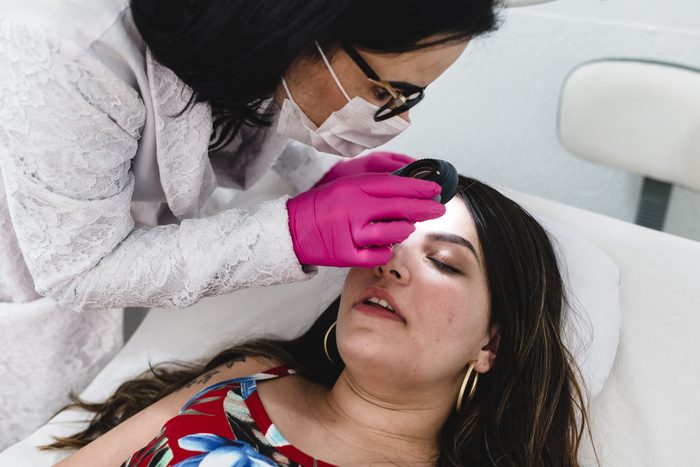
There’s nothing adults can do about acne
Everyone thinks about treating acne in teens but many adults treat it as something beyond their control. Not true, says Jessica Krant, MD, board-certified dermatologist and assistant clinical professor of dermatology at SUNY Downstate Medical Center in New York City. “Not realizing adults get real acne leads to delay in diagnosis and delay in proper, helpful treatment,” she says. Since your blemishes, facial rashes, or sensitivities could, indeed, be acne vulgaris (the Latin term for common acne), it’s best to see a dermatologist. (Here are the main causes of adult acne and what your doctor might advise to do about them.)
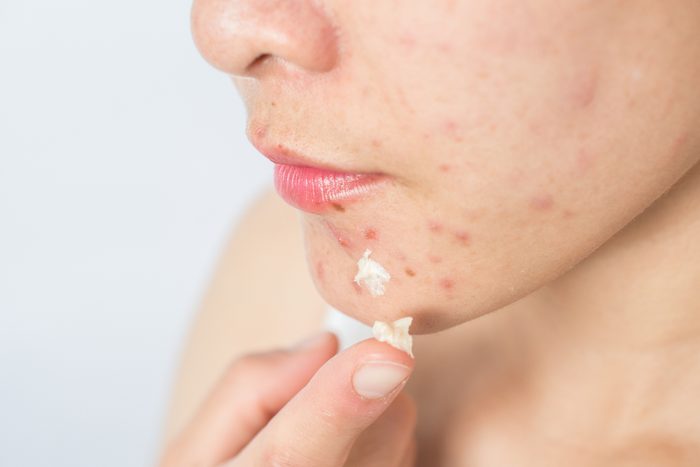
Spot treating a pimple will suffice
“There are many products on the market intended for people who want to dry up a single pimple,” says Dr. Krant. “But overapplying these medications dries and irritates the skin and can actually make a pimple hunker down and stick around even longer.” Instead, she advises use your regular acne regimen on a preventive basis so pimples do not develop, to begin with. (For a natural approach, you might also try tea tree oil and other home remedies for acne.)
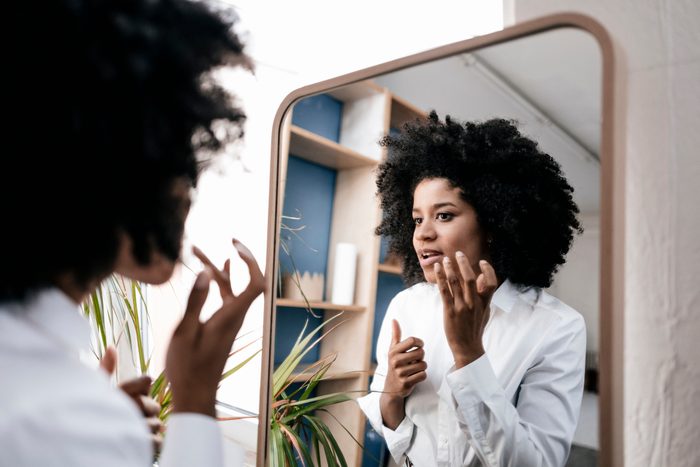
Your go-to treatment from high school will still work
“Acne products designed to treat teenage acne often don’t address the special skin-care needs of adults,” Dr. Kazin says. Instead of grabbing a tube of your old salicylic acid treatment or a jar of extra-strength acne pads, talk to your doctor about a topical retinoid, which not only prevents acne, but stimulates collagen to help with adult issues like lines and wrinkles, she says. (These are the best acne products from drugstores that dermatologists swear by.)
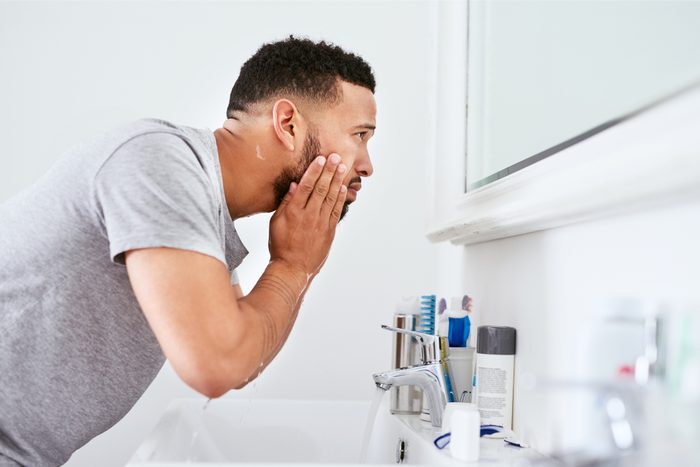
You need to scrub your face clean
While many people think acne is caused by dirty skin, it actually develops deep in your pores. “Washing your face any more than twice a day can dry out the skin, causing it produce more oil to compensate,” Dr. Kazin says. “Blasting your skin with harsh cleansers will only make it worse and you should never use antibacterial soap.” Instead, she recommends she recommends using a gentle cleanser, made specifically for the face, that won’t disrupt your skin barrier. (Here is the best way to wash your face to prevent acne during each stage of life.)
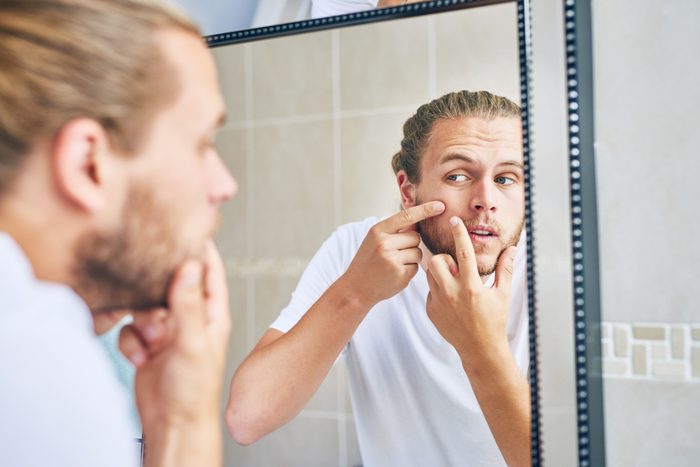
Squeezing that sucker will speed up the healing process
You probably know this isn’t true, but the temptation to pick at that deep pimple is often too powerful to ignore. Don’t do it. “If you pop it, the inflamed follicle will most likely break underneath the surface of the skin, exposing sensitive tissue to the bacteria of the pimple,” warns Dr. Krant. “You’ll risk a true infection at worst, and a much longer lasting swollen area, at best.” Try to control your urge to pick, and see your dermatologist for a painless cortisone shot to treat a deep cyst. (Touching pimples too much can also cause acne scars.)
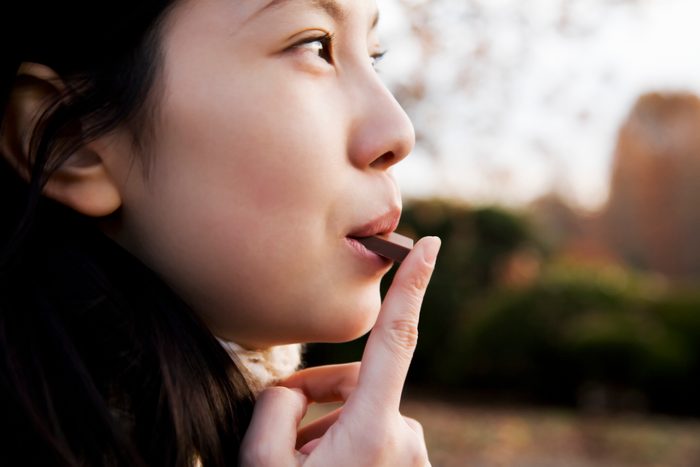
Greasy food is causing your acne
It’s a myth that eating pizza or chocolate or any greasy food will automatically cause acne. Your diet can play a role, however, in skin breakouts, says Jennifer Linder, MD, dermatologist, skin surgeon, a national spokesperson for The Skin Cancer Foundation, and clinical faculty member in the Department of Dermatology at the University of California, San Francisco. Eating an unhealthy diet—one high in processed foods and sugar and low in fruits and vegetables—causes inflammation through your whole body and inflammation can lead to acne flare-ups, she explains. Cutting out junk food and eating a wide variety of produce can reduce inflammation. Finding what is triggering your acne may take a little self-experimentation. “It’s possible that one person may react badly to dairy products or gluten while another will be able to eat bread and milk and be just fine,” she says. “It is very individual.” Dairy, specifically cow’s milk, as well as sugary and starchy foods can promote acne. Fat on the other hand has not been associated.

Tanning is a safe way to treat your skin
UV light from the sun may help reduce skin inflammation and treat acne, but it also can cause skin cancer and premature aging. There are much more effective and safer ways to treat acne. In fact, tanning can lead to dry, irritated, and inflamed skin. Tanning also promotes sweating, and excessive sweating can lead to clogged pores and more acne. Tanning also can lead to hyperpigmentation of the skin, making preexisting acne scars appear darker, she says.
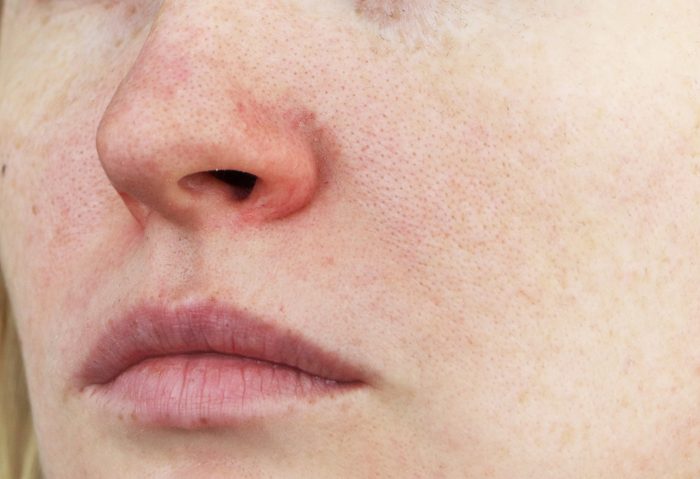
Any red bumps on your skin are acne
Rosacea is a very common skin condition that mainly occurs in adults over age 30. “Rosacea can seem like acne as they can share common features like redness and pimples,” says Dendy Engelman, MD, a dermatologic surgeon at Manhattan Dermatology and Cosmetic Surgery and Director of Dermatologic Surgery at New York Medical College. How to tell the difference? Look at the age at onset, location and symptoms. Acne can occur at any age, but is most common in teens and rosacea typically only occurs in adults. Rosacea mainly sticks to the central portion of the face whereas acne can be anywhere. Rosacea can irritate the eyes and doesn’t have blackheads, she explains.
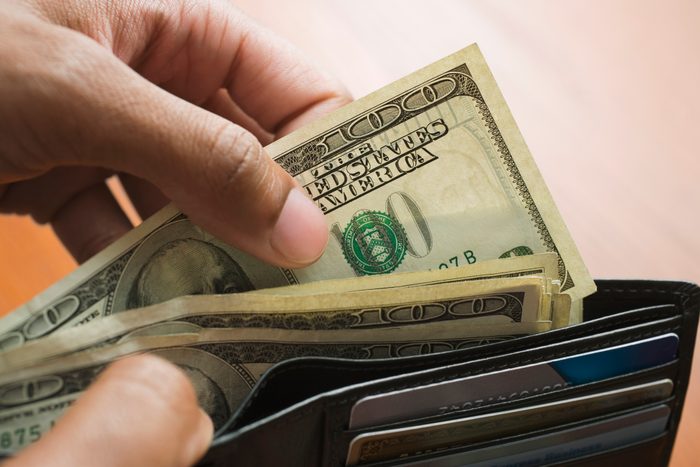
You have to pay a fortune for adult skin care
While adult skin does require different treatment than teen skin that doesn’t mean you need to fork out hundreds of dollars a month for some celebrity-approved skin care regimen, Dr. Engleman says. A lot of those are just overpriced lotions. There are many quality over-the-counter treatments that can help and if your doctor decides you need a prescription-strength product, ask about generic instead of brand-name options. “Talk to your doctor about which ingredients are most important for your skin type and which products will best help you,” she adds.
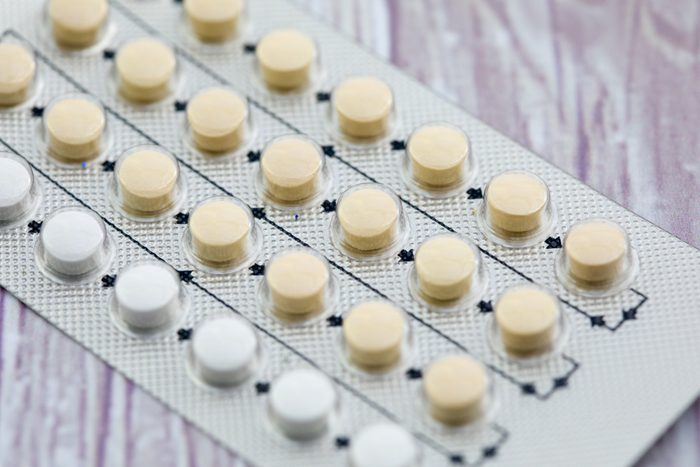
Hormones don’t matter
Think you’re done with hormone swings just because you’re done with puberty? Not so, Dr. Kazin says. Hormones are one of the main causes of acne, particularly in women. It’s common to have breakouts during periods of hormonal fluctuations including PMS, during pregnancy, after pregnancy, and during menopause, she says. Hormonal birth control can be a great tool in dealing with hormone-based acne and you can even use it during and after menopause, she adds. Keep reading for everything you need to know about hormone acne.